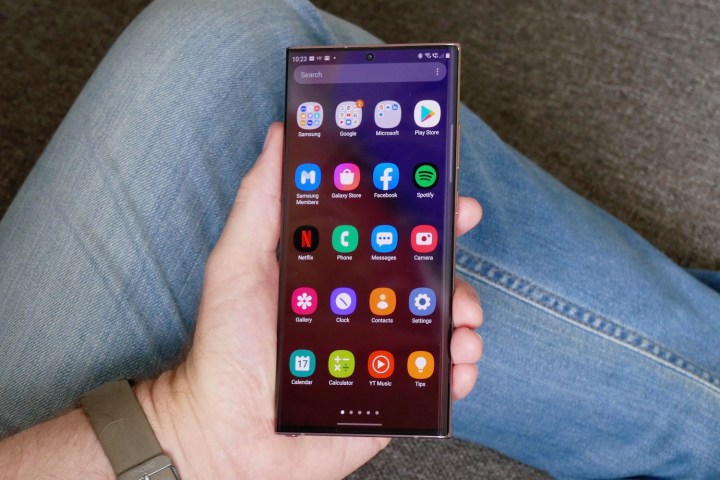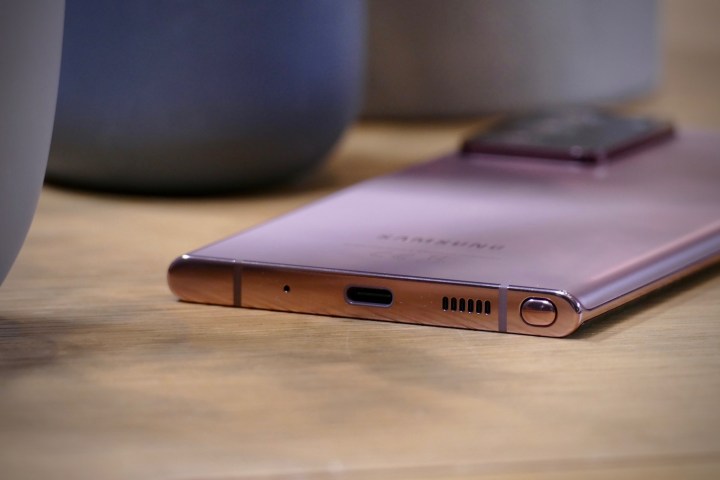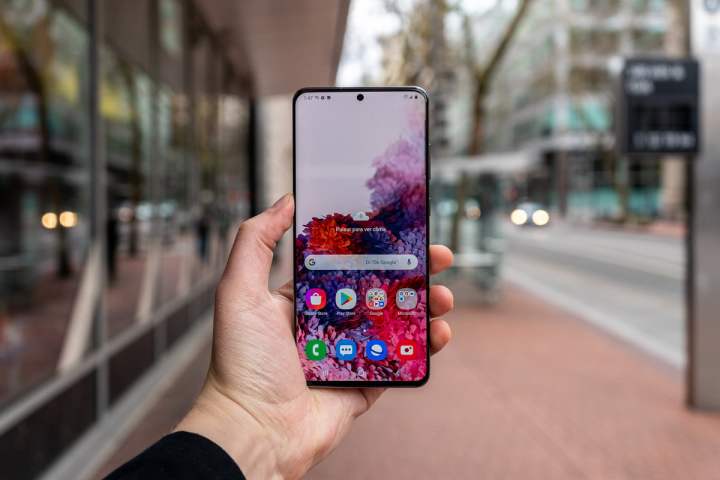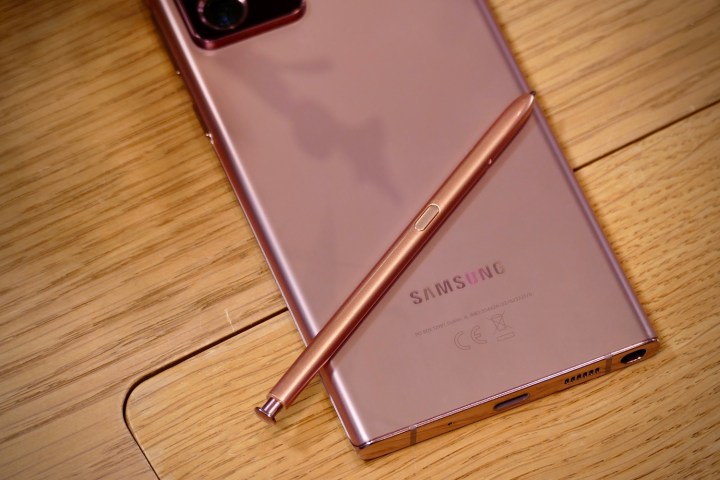The iPhone 12 Pro Max is Apple’s top-of-the-line smartphone for 2020. It combines a gleaming 6.7-inch Super Retina OLED screen with the super-fast A14 Bionic processor, 6GB of RAM, and a highly capable triple-lens camera. If you want the biggest and best iPhone available right now, it will almost certainly be your first port of call. However, it’s not the only super-phone currently available at the moment, with the Samsung Galaxy Note 20 Ultra also offering some of the highest specs you can possibly find on any smartphone.
Assuming that you don’t have a strong preference for iOS over Android (or vice versa), which one should you get? We try to answer this question by comparing the iPhone 12 Pro Max with the Galaxy Note 20 Ultra across a variety of categories. We take a closer look at their designs, displays, performance, batteries, cameras, software, and special features. This should help you decide which is the premium flagship for you.
Specs
| Samsung Galaxy Note 20 Ultra |
iPhone 12 Pro Max |
|
| Size | 164.8 x 77.2 x 8.1 mm (6.49 x 3.04 x 0.32 inches) | 160.8 x 78.1 x 7.4 mm (6.33 x 3.07 x 0.29 inches) |
| Weight | 208 grams (7.33 ounces) | 228 grams (8.04 ounces) |
| Screen size | 6.9-inch Dynamic AMOLED 2X | 6.7-inch Super Retina XDR OLED |
| Screen resolution | 3200 x 1440 pixels (511 pixels per inch) | 2778 x 1284 pixels (458 pixels per inch) |
| Operating system | Android 10, One UI 2.1 | iOS 14 |
| Storage | 256GB, 512GB | 128GB, 256GB, 512GB |
| MicroSD card slot | Yes | No |
| Tap-to-pay services | Google Pay, Samsung Pay | Apple Pay |
| Processor | Exynos 990 (global), Qualcomm Snapdragon 865 Plus (USA) | A14 Bionic |
| RAM | 12GB | 6GB |
| Camera | Triple-lens 108-megapixel, 12MP telephoto, 12MP ultrawide rear, 10MP front, | Triple-lens 12MP wide, 12MP ultrawide and 12MP telephoto rear, 12MP front |
| Video | 8K at 24 fps, 4K at 60 fps, 1080p at 240 fps, 720p at 960 fps | 4K at 60 fps, 1080p at 120 fps |
| Bluetooth version | 5.1 | 5.0 |
| Ports | USB 3.2, USB-C | Lightning |
| Fingerprint sensor | Yes, in-display | No, Face ID instead |
| Water resistance | IP68 | IP68 |
| Battery | 4,500Ah
Fast charging (25W) Qi wireless charging (15W) |
TBC
Fast charging (20W) Qi wireless charging (15W) |
| App marketplace | Google Play Store | Apple App Store |
| Network support | All carriers | All carriers |
| Colors | Mystic Bronze, Mystic Black, Mystic White | Silver, Graphite, Gold, Pacific Blue |
| Prices | $1,299 | $1,099 |
| Buy from | Samsung, AT&T, T-Mobile, Verizon, Amazon, Best Buy, Walmart | Apple, AT&T, T-Mobile, Verizon, Amazon, Best Buy, Walmart |
| Review score | 4.5 out of 5 stars | News |
Design, display, and durability

The iPhone 12 Pro Max and Note 20 Ultra both differ noticeably from their predecessors. The iPhone 12 Pro Max features flat-edged sides (for the first time since the iPhone 5) and a narrower notch, while the Note 20 Ultra sports a larger camera module than the Note 10 Plus and also has angular edges. Each smartphone looks very sharp in its own right, so it really depends on your tastes as to which one has a better design. That said, the Galaxy Note 20 Ultra is a touch bigger than the iPhone 12 Pro Max, and given that the iPhone is already very big as it is, this can mean that some people with average-to-small hands may find Samsung’s device a little uncomfortable with prolonged use.
Things become more objectively different with the displays. The Samsung Galaxy Note 20 Ultra boasts a 6.9-inch Dynamic AMOLED screen, which provides a resolution of 3200 x 1440 pixels, working out to 511 pixels per inch. It looks absolutely stunning, and while the iPhone 12 Pro Max is also gorgeous, it offers “only” 458 pixels per inch. This is still impressive, but you will notice a difference, particularly when Samsung’s phone supports a super-smooth 120Hz refresh rate, something that the iPhone 12 Pro Max lacks.
The 12 Pro Max and Note 20 Ultra are both IP68 certified, indicating that they can resist exposure to dust and immersion in shallow water for up to 30 minutes. The iPhone 12 Pro Max may be a touch more durable, since it incorporates Corning’s Ceramic Shield glass. However, with a tangibly sharper and more fluid display, we’re giving a narrow win for the Galaxy Note 20 Ultra in this round.
Winner: Samsung Galaxy Note 20 Ultra
Performance, battery life, and charging

Both the Note 20 Ultra and the iPhone 12 Pro Max house state-of-the-art processors. The Note 20 Ultra ships with the Snapdragon 865 Plus in the United States, while the iPhone comes with Apple’s A14 Bionic chip. It’s likely Apple’s processor is more capable, because it introduces 5nm technology, allowing for a greater number of transistors. On the other hand, it packs only 50% of the RAM you’ll find in the Galaxy Note 20 Ultra, at 6GB and 12GB. This probably means any differences even themselves out, seeing as how iOS and Android phones use RAM differently.
Samsung’s device gains a slight advantage as it comes with 256GB of internal memory as standard, while the iPhone 12 Pro Max provides you with 128GB. When you also factor in the Note 20 Ultra’s MicroSD card slot, this means the Samsung phone is probably the better choice for those who need extra storage space.
The battery is a difficult one to compare at the moment, since Apple doesn’t officially release the battery sizes of its devices, while we haven’t had enough time to fully test the iPhone 12 Pro Max. As for the Note 20 Ultra, it’s powered by a 4,500mAh cell, which allows it to last a full day even with heavy use. It’s possible that the iPhone comes close to matching this, with our review of the iPhone 11 Pro Max finding that it comfortably lasted a full day under similar conditions.
Because we haven’t given the iPhone 12 Pro Max a full review, we’re going to play it safe and call this round a tie. Both phones are likely to handle apps and games just as well, and while the Galaxy Note 20 Ultra is more generous with storage space, this may be outweighed by a potentially superior battery from the iPhone 12 Pro Max.
Winner: Tie
Camera

Judging purely by the specs, the Note 20 Ultra should surely have the iPhone 12 Pro Max’s camera beat. It comes with a 108-megapixel main camera lens, as well as a 12MP telephoto and a 12MP ultrawide. This triple-lens setup is the same as the 12 Pro Max’s, although Apple gives you only 12MP with the main wide lens.
This sounds like the iPhone 12 Pro Max should underperform significantly compared to the Note 20 Ultra. Nonetheless, as smartphones such as the Pixel 4a demonstrate, camera quality is as much about software as hardware. This very much applies to the iPhone 12 Pro Max, which will use the same A.I.-based software, the same Smart HDR, and the same Night Mode as the iPhone 11 Pro Max, as well as a new optical image stabilization system and a new 7-element lens. It should prove to be one of the very best smartphone cameras around, and will almost certainly give the highly versatile Note 20 Ultra a run for its money.
As with the performance round, Apple may (at least) equal the core performance of the Note 20 Ultra, but Samsung’s device throws in a few extra bells and whistles that potentially make it more attractive for some users. In this case, the Note 20 Ultra lets you shoot 8K video at 24 frames per second, while the iPhone 12 Pro Max will only go so far as 4K at 60fps. Still, 8K remains a relatively marginal standard at the moment, so only a small minority of users will feel the difference.
This round is another tie. We haven’t fully tested the iPhone 12 Pro Max yet, and while it lacks a 108MP wide camera lens, it could actually end up providing a much more versatile camera than the Galaxy Note 20 Ultra.
Winner: Tie
Software and updates

It’s Android versus iOS time. The Galaxy Note 20 Ultra runs on Samsung’s OneUI 2 OS, layered over Android 10. The iPhone 12 Pro Max uses iOS 14. Which one is better? The answer to this question is highly subjective, so we’re going to refrain from giving a definitive answer here. Needless to say, OneUI 2 is one of the best Android skins around, upping the customizability of Android, increasing its speed, and also making its design bolder and more colorful. The recently launched iOS 14 is also excellent, providing one of the biggest iOS updates in years, with its App Library, home screen widgets, Translate app, and back-tap shortcut.
Things are less subjective when it comes to updates. There’s little doubt that Apple is much better at rolling out new software versions in a more timely manner than Samsung, while it also supports its devices for longer. This round is therefore a win for the iPhone 12 Pro Max.
Winner: iPhone 12 Pro Max
Special features

The Galaxy Note 20 Ultra and the iPhone 12 Pro Max are both 5G phones. Unfortunately, the iPhone 12 Pro Max won’t support the faster mmWave 5G band outside of the United States, whereas Samsung’s phone supports mmWave in all regions where it’s available.
The Note 20 Ultra also comes with a stylus, the famous S-Pen. This effectively transforms it into a phablet, making it highly useful for professionals and creatives. If you need to take notes quickly or want to draw on your phone, it will noticeably improve your productivity.
The iPhone 12 Pro Max doesn’t offer stylus compatibility as a special feature. That said, it does find Apple reintroducing the MagSafe magnetic attachment system, meaning that you can use it with a range of first- and third-party magnetic accessories. We’re obviously not sure what the full range of these will be at the moment, but with wallet mounts and wireless chargers already released, they should prove helpful.
Another special feature worth mentioning is that the Note 20 Ultra has been built specifically for streaming Xbox games, a first among smartphones. You will need a subscription to Xbox Game Pass (at $15 per month) to stream titles, but given the Note 20 Ultra’s processing power, it really does transform it into a mini-console.
Taken with the stylus and the wider 5G support, the streaming capability means that this round is another win for Samsung’s phone.
Winner: Samsung Galaxy Note 20 Ultra
Price and availability
Prices for the Samsung Galaxy Note 20 Ultra start at $1,299. It’s supported by all major carriers and sold by most major online retailers.
The iPhone 12 Pro Max begins from $1,099 and is available to preorder from Apple now. It will be supported by all major carriers and sold by the vast majority of major retailers.
Overall winner: Samsung Galaxy Note 20 Ultra

Both smartphones are eye-wateringly good, but the Samsung Galaxy Note 20 Ultra is just about the overall winner here. It boasts a sharper, more dynamic screen, more internal memory as standard, and a wider range of special features. It also matches the performance of the iPhone 12 Pro Max, is likely to have a similarly long-lasting battery, and will keep photographers comparably happy.
However, keep in mind we haven’t finished testing the iPhone 12 Pro Max yet, so this could change after our review is complete. It is also worth noting, however, that the iPhone 12 Pro Max is $200 cheaper than the Note 20 Ultra. Given that both phones are already pretty expensive, this savings might be enough to sway some people who don’t want to spend that much. Particularly when the iPhone 12 Pro Max is already a truly excellent phone.



